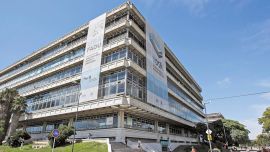Congress grilled the representatives of Pfizer and Laboratorios Richmond pharmaceutical companies last Tuesday with a special interest in the negotiations and contracts with the former.
Speaking via video conference to lawmakers, Nicolás Vaquer, the general manager of Pfizer Argentina, reaffirmed previous denials that "at no time during all the negotiation were there requests for undue payments or middlemen [on the part of the Argentine government]," rebuffing claims from PRO party leader Patricia Bullrich that government officials had requested bribes or kickbacks.
He also rejected claims that the US pharmaceutical giant had sought specific guarantees to protect itself against potential legal claims, saying that the firm does not “have any interest in state assets, [Argentina’s] natural resources, Central Bank reserves, cultural heritage or anything of the kind."
Vaquer, who was accompanied by Pfizer’s executive Miguel del Pino, told the deputies that the contract with this country had been frustrated by "an incompatible legal framework." He said the lab had offered the Alberto Fernández government 13.5 million vaccines against coronavirus over the 18 months as from late 2020 (including only a million last year, two million in the last quarter and five million in this quarter), even if other labs had accepted the conditions imposed by Argentine law.
The Juntos por el Cambio opposition has proposed removing the word “negligence” from the law governing vaccine purchases approved last October, on the understanding that this is the main obstacle to a Pfizer contract. Vaquer, however, also cited differences over “guarantees” as an obstacle, underlining that the conditions proposed for a contract were a standard text signed by 116 other countries.
Juntos por el Cambio caucus chief Mario Negri (Radical-Córdoba) was quick to pick up Vaquer’s words about legal incompatibility, warning: "The striking thing here is that he said they [Pfizer] were not invited by the government to participate in drawing up the law. Quite clear that the government gave priority to labs like AstraZeneca."
Along similar lines Karina Banfi (Radical-Buenos Aires Province) said: “The Pfizer representative has made it clear that they spelled out their requirements for a contract and that the government decided not to invite them to participate in the legislative process. When the word ‘negligence’ was inserted, they knew they were leaving Pfizer out.”
Their youthful colleague Alejandro Cacace (Radical-San Luis) chipped in: "Finally light has been shed on the issue of the Pfizer vaccine. If the government had contracted with that company, we would already have received eight million vaccines, saving countless lives."
“This is the first time the Pfizer lab has recognised what its motives were for not closing this contract with Argentina, that’s why we consider this reply very important,” commented Rubén Manzi (Civic Coalition-Catamarca).
"We’re conversing with the state" on a possible contract, revealed Vaquer, while adding that it was up to the government to decide with what vaccines it wished to seal agreements.
There were contacts at a technical level towards a possible agreement with officials from both the Health Ministry and the legal department (Secretaría Legal y Técnica), as well as lawyers present, the Pfizer official said, with "concrete proposals" arising out of the talks.
In answer to a specific question regarding the timetable by deputy Claudia Najul (Radical-Mendoza), Vaquer explained that Pfizer had signed its confidentiality agreement with Argentina on July 11 with the first contractual proposal made at a video conference on July 25 (before there was any vaccine) and sent to the Health Ministry two days later.
"In that context, 13.2 million vaccines were offered for delivery as from the end of 2020, then there was a second offer on October 1 and the law was published [in the Official Gazette] on November 6," recounted Vaquer, also commenting that the government "was negotiating volumes with other providers and asked us to accelerate the deliveries."
Sputnik VIDA by June 19?
After a brief recess, it was the turn of Laboratorios Richmond President Marcelo Figueiras to give details on the local manufacture of the Sputnik V vaccine to the Congress session summoning labs to explain their negotiations, contracts and delivery delays to the Health and General Legislation Committees.
Figueiras confirmed last Tuesday that the first batch of Sputnik Vida, the local version of the Russian vaccine, will be ready by next weekend (June 19) for analysis by ANMAT (the Argentine equivalent of the Food & Drug Administration in the United States) and the Gamaleya Institute, which developed the original antidote to Covid-19.
Figueiras also told the deputies that his Richmond lab had the capacity for a weekly output of half a million doses with medium-term expectations of a monthly production of five million, always depending on the construction of a "model biotech plant" permitting the assembly of a "vaccine hub."
"As we know, the countries which produce, vaccinate and those who don’t wait,"
lamented Figueiras, expressing his enthusiasm for the advance of local alternatives for production.
This enthusiasm prompted Negri to warn against "any false nationalism for the work of a lab here because our obsession is to have vaccines so that people do not die."
"We were invited by [India’s] Hetero lab, not the national government," underlined Figueiras, detailing: "We could manufacture half a million doses weekly of both components in its final productive stage" and adding: "I didn’t have the faintest idea that the Hetero people were going to call me from Moscow to work on this."
"We must bring calm because with the first component of the vaccine we can avoid the collapse of the health system," indicated Figueiras, who also maintained that his company had not received "any financing" in the context of its agreement with Russia.
"Everything we have done until now has been with our own capital. We received no financing. Plenty of banks, both public and private, showed interest but we have not had any kind of financing for this project," he elaborated.
‘Certainty, not fears’
When opening the enquiry (a televised plenary session of the Health and General Legislation Committees), Speaker Sergio Massa asked the opposition "to seek certainty and not fears."
"The decision was taken to constitute a commission using lower house rules in order to have the maximum information possible on a highly sensitive issue interesting society," emphasised Massa, adding that Congress was bound to give the "highest level of transparency and certainty" to the citizenry.
"There is a global dispute over vaccines," underlined Massa, saying that "the aim of this session is to open up a path which does not transform this into a commission of aggression or search for culprits but rather for solutions in order to co-operate with the government."
Nor was it "a commission to investigate labs or the pharmaceutical industry," he said.
"Our president has enjoined us to work as a kind of monitoring observatory in order to keep control, but also to have the responsibility to be part of the solution and not an obstacle and part of the problem," concluded Massa, who had taken the initiative to summon the lab representatives last June 2 with the assent of most caucuses.
Massa anticipated a similar session next week with diplomats representing the Russo-Chinese labs producing the Sputnik V and Sinopharm vaccines. Given the diplomatic presence, Massa plans to add the Foreign Relations Committee headed by Frente de Todos deputy Eduardo Valdés to the session.
Leading government deputies participating were Frente de Todos caucus chief Máximo Kirchner and Cristina Alvarez Rodríguez while Negri and Juan Manuel López headed the opposition with third party leaders such as Eduardo "Bali" Bucca y José Luis Ramón also present. The Health (Yedlin and Carmen Polledo) and General Legislation (Cecilia Moreau and Carla Carrizo) Committees were represented by their two senior authorities.
Health Committee chairman Yedlin confirmed that it was not thought necessary to amend the vaccine legislation since it was enough for the vaccination of the elderly.
Health Minister Carla Vizzotti was not present but in a statement she asked politicians to "tone down the tension and tone down their obsession" with the Pfizer vaccine against coronavirus in a reply also acknowledging the legal problems preventing the advance of the contract.
“The different providers from the pharmaceutical industry have requested from the Argentine governments conditions such as a rollover of jurisdiction, asset indemnisation and confidentiality agreements in observance of the situation on the international market for vaccines," read the statement. "That is why Congress passed Law 27,572 for vaccines destined to generate acquired immunity against Covid-19. Nevertheless, after this law was published, Pfizer manifested in its negotiations the need to contemplate clauses with requirements exceeding the exceptional circumstances provided for in the aforementioned norm.
"The difficulties with the United States company were rooted in two problems. The first was seeking to exclude negligence not only from the contract but also from the aforementioned law, thus implying its amendment. The second problem is related to the criteria for accepting guarantees in the form of foreclosures abroad. Those are the two points over which agreement was reached. During the month of April and to this day Argentina has resumed conversations with the Pfizer lab to advance in a possible agreement to supply vaccines against Covid-19.”
Opposition legislators took advantage of the presentation by Pfizer lab to ask if an amendment of the norm would facilitate agreement. Last week Polledo, the deputy chair of the Health Committee, presented a bill to eliminate the word “negligence” from last October’s law.
Tuesday’s Congress session with the labs producing vaccines against coronavirus also included the participation of representatives from Sinopharm (China), the Gamaleya Institute (Russia), the Covax Fund and the Serum Institute (India) which elaborated the Covishield vaccine with the component of the Oxford University-AstraZeneca vaccine, while AstraZeneca itself gave the event a miss, presenting a written statement.
Moreau had harsh words for the opposition, calling their attitude to the pandemic "destructive" and expressing her hope that they "would now cut it out with the Pfizer novel."
"You were a rock-bottom government and now just as rotten as an opposition," Moreau told her political adversaries.
– TIMES/PERFIL
























Comments